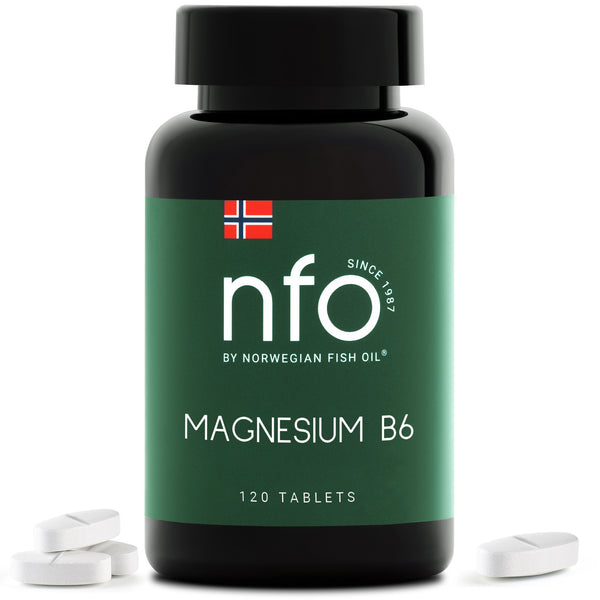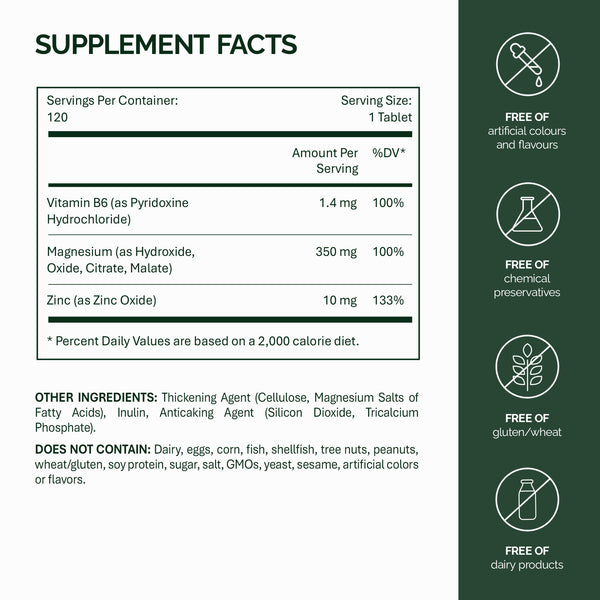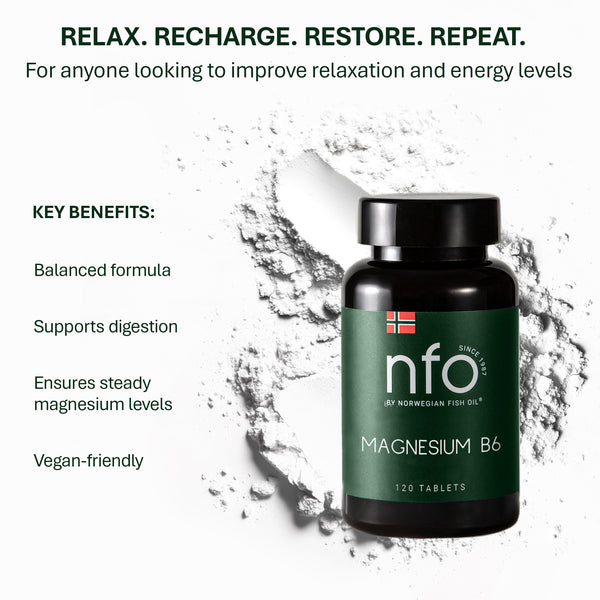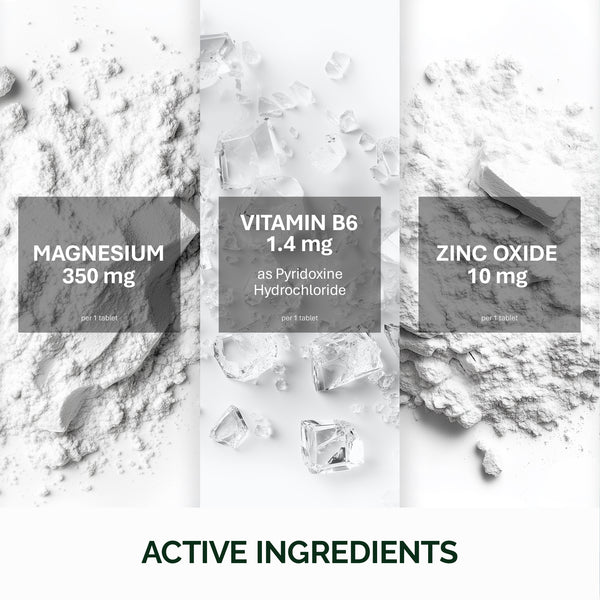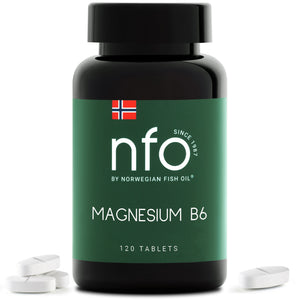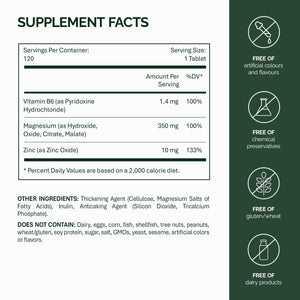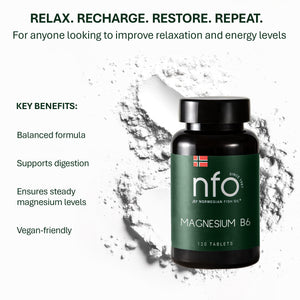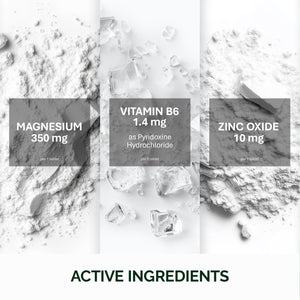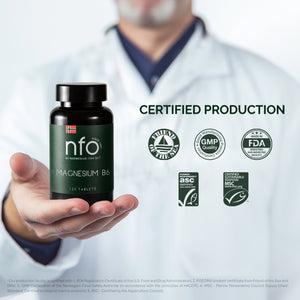
Magnesium glycinate is a popular magnesium supplement that blends elemental magnesium with the calming amino acid glycine. Magnesium (Mg) is an essential mineral that the body needs for muscle and nerve function, bone health, and a regulated sleep-wake cycle. Adults generally require about 310–420 mg of magnesium per day (from food and supplements combined). You can get a lot of magnesium from foods like nuts, seeds, leafy greens and whole grains (see chart below) – but many people still fall short of their needs. Magnesium glycinate is a chelated form: it combines magnesium with glycine, which makes it highly bioavailable (easy to absorb). In other words, your body can soak it up more easily than some other forms. Because glycine itself is a gentle neurotransmitter, magnesium glycinate is known for its calming properties.
In practice, that means it is often used to help you relax, unwind, and even drift off to sleep.
Magnesium glycinate supplements usually come in tablet or powder form (pills, capsules, liquids). Always check the label for how much elemental magnesium you are actually getting. Many products are labeled by the weight of “magnesium glycinate” compound, but what matters is the elemental Mg content. For example, a 400 mg magnesium glycinate capsule might contain only ~100 mg of elemental magnesium. Pro tip: look for “elemental magnesium” on the label to know your true dose.
Sleep and anxiety benefits
When life is a bit chaotic, magnesium glycinate can be a real chill-out aid. This combo plays a direct role in the nervous system. Magnesium binds to GABA receptors in the brain, boosting GABA levels – GABA is the neurotransmitter that slows brain activity and promotes relaxation. It also helps regulate melatonin (your sleep hormone) and balance stress chemicals like cortisol. In short, magnesium glycinate is known to calm the mind and body. Below are the main perks people report:
- Better sleep quality: Research shows magnesium can help you fall asleep faster and sleep more soundly. In older adults, magnesium supplements led to longer sleep time and less waking up during the night. Cleveland Clinic notes that small studies found magnesium can “make it easier to fall asleep” and “improve sleep quality”. The glycine part may enhance this – it is naturally soothing. Many users find magnesium glycinate especially helpful if sleeplessness is linked to leg cramps or anxiety (it may reduce restless leg symptoms, too).
- Reduced anxiety & stress: If you have been feeling wired or stressed, magnesium glycinate might help mellow you out. Studies consistently show anxiety improvements – in a review of trials, 5 out of 7 anxiety studies reported that magnesium (any form) lowered self-reported anxiety levels. In practical terms, users often say they feel “less jittery” or “more relaxed” after taking it. Magnesium supports a healthy stress-response: it blunts the fight-or-flight hormones and helps quiet racing thoughts.
- Muscle & nerve relaxation: Magnesium is a natural muscle relaxant. It opposes calcium’s contraction signal in muscles, so adding magnesium glycinate can ease tension and spasms. Many people take it for leg cramps or restless legs syndrome (RLS) at night. While evidence is limited, some research suggests a link between higher magnesium levels and reduced leg cramp frequency. Even if cramps are not your issue, relaxed muscles help you sleep more deeply.
- General well-being: Beyond sleep/anxiety, magnesium supports heart rhythm, bone strength, and blood sugar. It can keep the body “chill” on a cellular level. Some reviews link regular magnesium with lower blood pressure and improved mood over time. For example, one analysis notes magnesium supplements may lower the risk of stroke or diabetes in the long run. These extras are nice bonuses on top of the main sleep/stress effects.
Best time to take Magnesium Glycinate
When and how you take magnesium glycinate can tweak its effects:
- Morning vs. night: Think about why you are taking it. If your goal is better sleep or nighttime anxiety relief, take it about 30–60 minutes before bed. Its calming effect will help you wind down. Cleveland Clinic, for instance, recommends ~200 mg of elemental magnesium 30 minutes before bedtime for sleep. On the other hand, some people prefer a morning dose to support daytime energy and mood. Magnesium actually also helps with muscle relaxation and stress, so a morning dose can reduce daytime tension. In fact, splitting your dose is fine too – taking some in the AM and some in the PM works for many.
- With food (not empty stomach): For best results and comfort, take magnesium glycinate with a meal or snack. This slows absorption just enough to prevent stomach upset. Even though glycinate is gentler than some forms, high doses on an empty stomach can cause nausea or diarrhea in sensitive folks. So if you find yourself feeling queasy, try taking it with a little food. That said, some people do tolerate it on an empty stomach – just listen to your body.
- Medications & timing: Be mindful of other pills. Magnesium can bind certain drugs and reduce their absorption. For example, it can interfere with some antibiotics (like tetracyclines and quinolones) and with thyroid meds (like levothyroxine). A good rule is to take magnesium glycinate 2–4 hours apart from such medications. If you are on osteoporosis drugs, heart meds, or antibiotics, check with a doctor or pharmacist about timing. In most cases, just space them out, and magnesium will still help you without messing up your prescriptions.
Common mistakes to avoid
Even though magnesium glycinate is safe for most people, a few slip-ups can reduce its benefits. Watch out for these pitfalls:
- Ignoring the “elemental” dose: Do not assume the milligram number on the bottle is all elemental magnesium. Supplements often list the weight of the entire magnesium glycinate compound. Always check the label to see how many milligrams of elemental magnesium you are getting. For example, a 400 mg “magnesium glycinate” pill might only have ~100 mg of actual magnesium. This confusion leads some people to under-dose (or accidentally over-dose) on elemental magnesium. Always verify the elemental amount.
-
Taking too much at once: More is not always better.
Experts generally advise ≤350 mg per day from supplements to avoid side effects.
If you take a very large dose in one go, you risk digestive upset or diarrhea. If you need a high total dose, split it into two or three smaller doses during the day instead of one giant pill. Also remember that this 350 mg limit is for supplements – you can still get more magnesium safely from food. - Skimping on food: Some users try to take magnesium on an empty stomach for “faster effect.” This often backfires. As above, take it with meals to ease absorption and reduce nausea. Especially if you have a history of stomach sensitivity, always pair it with some food or a snack.
- Not being consistent: Magnesium is not a stimulant; it works best with regular use. You might not feel a dramatic change overnight. Missing doses or taking it only sporadically is a common mistake. For sleep or anxiety issues, try taking it nightly (or at the same daily time) for a couple of weeks to truly assess the effect.
- Mixing with alcohol and dehydration: Alcohol is not a direct contraindication, but it does deplete magnesium. If you binge drink, you are flushing magnesium out, which can worsen sleep and hangovers. It is fine to drink moderately while supplementing, but do not rely on magnesium glycinate to cure a hangover. Also, magnesium is mildly osmotic (it draws water into your gut), so stay hydrated – especially if you have had alcohol.
- Quality control: Supplements are not FDA-regulated like drugs. A good practice is to choose a third-party tested brand (look for USP, NSF, or ConsumerLab seals). Cheap off-brand products might not contain what they claim. This is not a side effect per se, but a safety issue. Buying a reputable magnesium glycinate supplement helps avoid contaminants and ensures you get the actual dose listed.
Real Pros & Cons
Whether magnesium glycinate is “good” or “bad” depends on your needs. Here are the real pros and cons to weigh:
Pros:
- Highly absorbable: The glycine chelate means your gut can soak up more magnesium compared to forms like oxide. In practice this often means you need a smaller dose to get results.
- Calming effect: Many users report improved relaxation, easier sleep, and less daytime anxiety with magnesium glycinate. The dual action (Mg + glycine) targets both nerve and muscle calm.
- Gentler on the gut: Although any magnesium can cause loose stools, glycinate is typically milder than magnesium citrate or oxide. One study noted it “may be less likely to cause diarrhea” than other forms. This makes it a good daily option for people prone to tummy upset.
- Few major side effects: At normal doses, side effects are generally mild if they occur at all. Unlike prescription sleep meds, it is non-habit-forming and only causes serious problems at extremely high doses. (We will list those rare issues in Cons below.)
- Supports overall health: Beyond sleep, it is great for muscle recovery after exercise, heart rhythm, and even PMS symptoms.
Cons:
- GI upset at high doses: The most common side effects are digestive: diarrhea, nausea or stomach cramps. This usually only happens if you take a large dose or take it on an empty stomach. If it occurs, cut back your dose or take it with food.
- Drowsiness/low blood pressure: Magnesium’s relaxation can be a con if you overdo it. Very high doses may cause excessive drowsiness, muscle weakness or even a drop in blood pressure. Stick to recommended amounts to avoid this.
- Interactions: As mentioned, magnesium can interfere with absorption of certain medications. If you are on thyroid drugs, osteoporosis meds, or certain antibiotics, you have to time them properly.
- Kidney considerations: If you have kidney disease or severe renal impairment, magnesium clearance can be an issue. Those patients are often advised not to supplement without doctor guidance. In healthy adults, the kidneys generally flush out excess, so toxicity is rare.
- Not a quick fix: Unlike a sleeping pill that knocks you out, magnesium’s effects build up over days or weeks. If you need an immediate sedative effect, you might not get it. Patience and consistency are key.
FAQs
- Stopping magnesium glycinate: Good news – you can stop taking it at any time. There is no withdrawal or “dependency.” If you were using it to manage insomnia or stress, those symptoms may come back once you stop. If you have no deficiency, stopping simply means your magnesium levels will rely on diet again. In short: there is no harm in taking breaks, but any benefits (better sleep, less cramps) may fade off if you quit.
- Magnesium and alcohol: There is no direct dangerous interaction between moderate alcohol use and magnesium glycinate. Many people take them together without issue. In fact, some practitioners say magnesium helps mitigate alcohol’s dehydrating effects. However, remember that heavy drinking depletes magnesium, which can worsen poor sleep and cause headaches. If you drink a lot, it is smart to keep up your magnesium (and water) intake. But do not consider magnesium a hangover cure!
- Recommended dosage: Adult needs vary (310–420 mg/day total RDA), and supplement dosage depends on why you are taking it. For general supplementation, many start with 100–200 mg elemental magnesium per day. Cleveland Clinic suggests about 200 mg nightly if your goal is better sleep. Some people go as high as 300–400 mg in divided doses, but research and experts caution staying under 350 mg of supplemental magnesium per day to minimize side effects. If you have special conditions (premenstrual issues, migraine, etc.), higher doses might be used under a doctor’s care. Always check the label for elemental mg, and if unsure, consult your healthcare provider for a personal dose.
- What about a 400 mg magnesium glycinate tablet? Some supplements are labeled “400 mg magnesium glycinate.” Often this refers to the weight of the full compound, not the elemental magnesium. A tablet of 400 mg magnesium glycinate might only contain about 100 mg elemental magnesium. So if a label does not explicitly say “elemental Mg,” use the fact sheet as a reminder to calculate the actual dose.
Overall, magnesium glycinate is an easy-to-take, versatile supplement for calming the nerves and aiding sleep. Its downsides are few if used properly. Pair it with healthy sleep habits (cool dark room, no screens, regular bedtimes) and you will maximize its benefits. As always, keep an eye on your total magnesium intake, stay hydrated, and talk to your doctor if you have any medical concerns.
References
- Cleveland Clinic. Magnesium for Sleep: Benefits, Risks, and More. 2022. https://health.clevelandclinic.org/magnesium-for-sleep
- National Institutes of Health (NIH) Office of Dietary Supplements. Magnesium Fact Sheet for Health Professionals. Updated 2022. https://ods.od.nih.gov/factsheets/Magnesium-HealthProfessional/
- Sleep Foundation. Magnesium and Sleep. 2022. https://www.sleepfoundation.org/nutrition/magnesium-and-sleep
- National Library of Medicine – PubMed Central. Role of magnesium in the pathogenesis and treatment of migraines. 2012. https://pubmed.ncbi.nlm.nih.gov/23024529/
- Healthline. Magnesium Glycinate: Benefits, Side Effects, Dosage, and More. 2023. https://www.healthline.com/nutrition/magnesium-glycinate
- Verywell Health. What to Know About Magnesium Glycinate. 2023. https://www.verywellhealth.com/magnesium-glycinate-5195547
- Examine.com. Magnesium – Human Effect Matrix. 2023. https://examine.com/supplements/magnesium/
- Frontiers in Nutrition. The Effects of Magnesium Supplementation on Subjective Anxiety and Stress. 2017. https://www.frontiersin.org/articles/10.3389/fnut.2017.00027/full
- Medical News Today. Magnesium glycinate: Uses, benefits, and side effects. 2021. https://www.medicalnewstoday.com/articles/magnesium-glycinate
- ConsumerLab. Best Magnesium Supplements: Review and Comparisons. Updated 2023. https://www.consumerlab.com/reviews/magnesium-supplements/magnesium/
